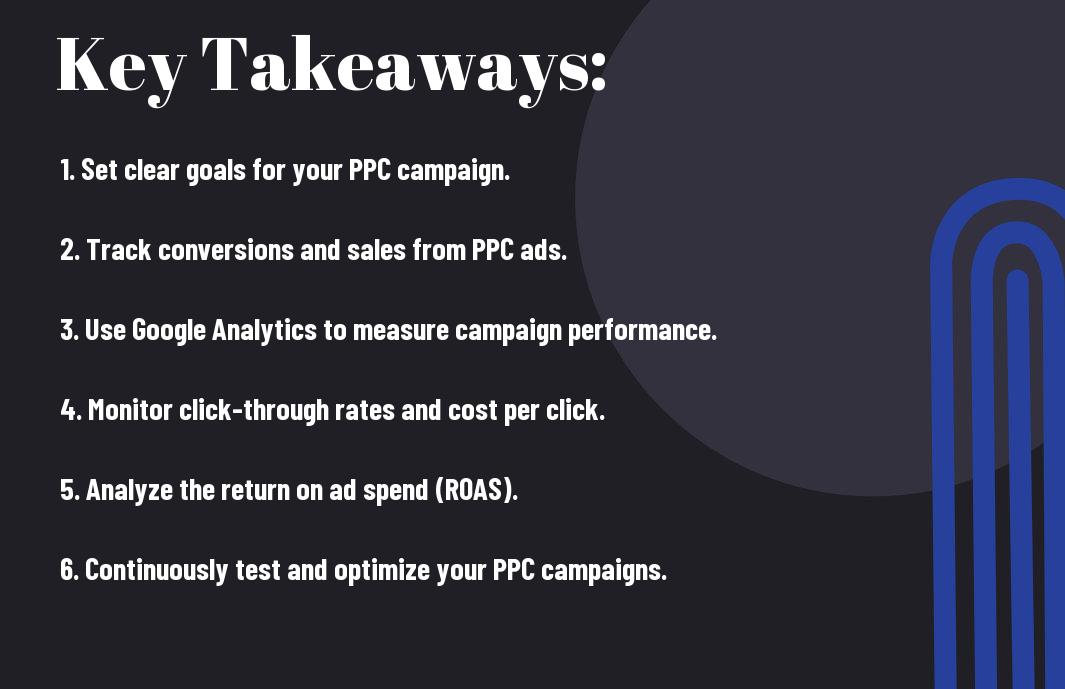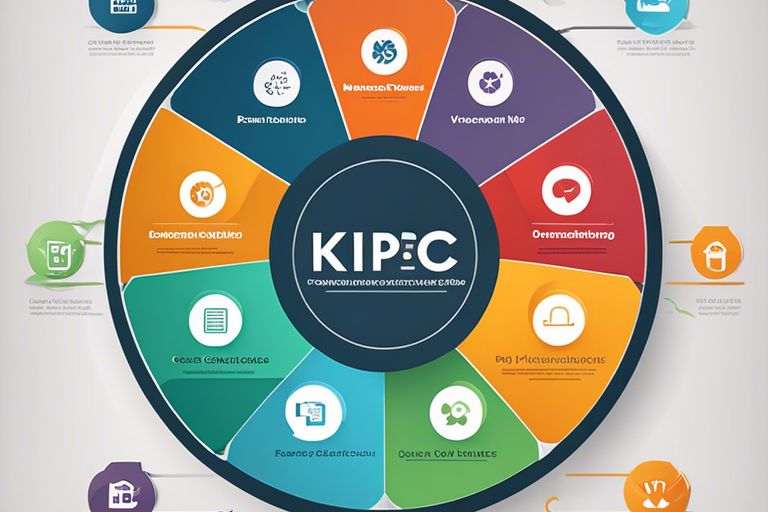Do you find yourself struggling to determine the effectiveness of your Pay-Per-Click (PPC) advertising efforts? It’s crucial to understand the key metrics that will help you measure the success of your campaign. By analyzing important indicators such as click-through rate, conversion rate, and return on ad spend, you can gain valuable insights into the performance of your PPC ads. In this blog post, we will discuss the critical factors that indicate the success of your PPC campaign, and provide you with actionable steps to effectively measure and optimize your advertising efforts.
Key Takeaways:
- Identify clear goals: Before you measure the success of your PPC campaign, it’s crucial to have a clear understanding of what you’re trying to achieve with your ads.
- Use relevant KPIs: Focus on key performance indicators (KPIs) that align with your goals, such as click-through rate, conversion rate, and cost per acquisition.
- Regularly analyze data: Monitor and analyze your campaign data regularly to identify trends, opportunities for improvement, and areas of underperformance.
- ROI is key: Ultimately, the success of your PPC campaign should be measured by your return on investment (ROI). Make sure your campaign is generating a positive ROI and adjust as needed.
- Keep testing and optimizing: A successful PPC campaign involves continuous testing and optimization to improve results. Don’t be afraid to experiment with different ad formats, targeting options, and messaging to find what works best for your business.

Defining Campaign Goals
If you want to measure the success of your PPC campaign, you need to start by defining clear campaign goals. This will help you identify what you want to achieve and track the right metrics to determine your success. Setting the right goals will also guide your strategies and tactics to ensure you are on the right path towards achieving your objectives. To learn more about how to measure PPC campaign success and increase your ROI, check out this guide.
Setting Quantifiable Objectives
When setting your campaign goals, it’s crucial to make them quantifiable. This means defining specific, measurable outcomes that you want to achieve through your PPC efforts. By setting quantifiable objectives, you can track and measure the success of your campaign with clear, tangible results. Whether it’s increasing website traffic, generating leads, or boosting sales, quantifiable objectives will help you gauge the impact of your PPC campaign.
Understanding Different KPIs
Key Performance Indicators (KPIs) are essential metrics that help you evaluate the performance of your PPC campaign. Understanding the different KPIs related to your campaign goals is crucial for measuring success accurately. Whether it’s click-through rate (CTR), conversion rate, cost per acquisition (CPA), or return on ad spend (ROAS), each KPI provides valuable insights into the effectiveness of your PPC efforts. By analyzing these KPIs, you can identify areas of improvement and optimize your campaign for better results.
Data Analysis and Interpretation
Unlike traditional marketing methods, PPC campaigns provide you with a wealth of data that can be analyzed to measure success. Understanding how to interpret this data is crucial in determining the effectiveness of your campaign. By analyzing the data, you can make informed decisions on how to optimize your PPC strategy for better results.
Key Metrics to Track
When analyzing the success of your PPC campaign, there are several key metrics you should track to gauge its effectiveness. These include click-through rate (CTR), conversion rate, cost per click (CPC), return on ad spend (ROAS), and quality score. Tracking these metrics will give you a comprehensive view of your campaign’s performance and help you identify areas for improvement.
Tools and Platforms for Measurement
Utilizing the right tools and platforms for measurement is essential in accurately assessing the success of your PPC campaign. Google Analytics and Google Ads are powerful tools that provide in-depth insights into the performance of your ads. By leveraging these platforms, you can track and analyze key metrics, identify trends, and make data-driven decisions to optimize your campaign for better results. Additionally, utilizing third-party tools such as SEMrush, Ahrefs, and Moz can provide you with additional insights and help you gain a competitive edge in the market.
When analyzing the success of your PPC campaign, it’s important to pay attention to key metrics such as click-through rate (CTR), conversion rate, cost per click (CPC), return on ad spend (ROAS), and quality score. These metrics provide valuable insights into the performance of your campaign and help you identify areas for improvement.
Utilizing the right tools and platforms such as Google Analytics, Google Ads, SEMrush, Ahrefs, and Moz is essential in accurately assessing the success of your PPC campaign. These tools provide you with in-depth insights and help you make data-driven decisions to optimize your campaign for better results.
Optimization Strategies
Keep refining your PPC campaign with optimization strategies to ensure continued success. Utilize relevant keyword research to enhance targeting and performance. Improve ad copy and landing page experience to increase click-through rates and conversions. You can also utilize ad extensions to provide additional information and encourage potential customers to interact with your ads. For more detailed guidelines on how to track and measure the success of your PPC campaign, consult this PPC Guide: Tracking and measurement for PPC campaigns.
Analyzing A/B Testing Results
When analyzing A/B testing results, it’s important to look for statistically significant differences between the two variations. Pay attention to metrics such as click-through rate, conversion rate, and cost per conversion. Identify the best performing elements and implement them into your campaign. It’s essential to continuously test and refine your PPC elements to ensure the highest possible performance and conversions.
Continuous Improvement and Adaptation
Continuous improvement and adaptation are crucial for the success of your PPC campaign. Regularly monitor the performance of your ads and keywords, and make adjustments as needed. This could include pausing underperforming ads, refining keywords, and testing new ad copy. By staying agile and adapting to changes in the market, you can ensure that your PPC campaign remains effective and delivers a strong return on investment.
Case Studies and Success Stories
After investing in a PPC campaign, you want to know if it was successful. Here are some case studies and success stories to demonstrate the effectiveness of PPC advertising:
- Case Study 1: Company A saw a 200% increase in website visits and a 30% rise in sales after optimizing their PPC ads with targeted keywords and compelling ad copy.
- Case Study 2: Company B experienced a 50% decrease in their cost per click and a 20% boost in their conversion rate after restructuring their PPC campaign based on user behavior data.
- Case Study 3: Company C achieved a 1000% return on ad spend by incorporating remarketing into their PPC strategy, reaching a higher percentage of potential customers who had previously visited their website.
Real-World Examples
When it comes to PPC advertising, real-world success stories can serve as an inspiration for your own campaign. Imagine being able to replicate the strategies that led to a 200% increase in website visits or a 1000% return on ad spend. These examples show you just how powerful and impactful PPC advertising can be for your business.
Lessons Learned from Successful Campaigns
By studying successful PPC campaigns, you can gain valuable insights into what works and what doesn’t. Whether it’s optimizing ad copy, targeting specific keywords, or leveraging remarketing, there are key techniques that you can apply to your own PPC strategy to maximize results and drive growth for your business.

Conclusion
Drawing together the various metrics and KPIs discussed, you can see that measuring the success of your PPC campaign is essential for optimizing its performance and ensuring a strong ROI. By tracking click-through rates, conversion rates, and cost per conversion, you can pinpoint which aspects of your campaign are working well and which need improvement. Additionally, monitoring bounce rates and average session duration can give you insights into the quality of your traffic and the relevance of your landing pages. By consistently analyzing and adjusting these key indicators, you can ensure that your PPC campaign continues to drive valuable results for your business.
FAQ: How to Measure the Success of Your PPC Campaign
Q: What is PPC and why is it important?
A: PPC, or pay-per-click, is a digital advertising model where advertisers pay a fee each time their ad is clicked. It is important because it allows businesses to reach their target audience quickly and effectively, driving traffic to their website and increasing potential customer engagement.
Q: What are the key metrics to measure the success of a PPC campaign?
A: Key metrics to measure the success of a PPC campaign include click-through rate (CTR), conversion rate, return on ad spend (ROAS), cost per conversion, and ad position. These metrics help assess the effectiveness of the campaign in reaching and converting the target audience.
Q: How do you track and analyze these metrics?
A: Tracking and analyzing these metrics can be done through digital marketing platforms such as Google Analytics, which provides insights into the performance of PPC campaigns. Additionally, PPC platforms like Google Ads and Bing Ads offer robust reporting tools to track and analyze campaign metrics.
Q: What is the significance of A/B testing in measuring PPC campaign success?
A: A/B testing, also known as split testing, is essential in measuring PPC campaign success as it helps determine which ad variations perform better. By testing different ad elements such as headlines, images, and ad copy, advertisers can optimize their campaigns for better performance and higher ROI.
Q: How do you use the data from measuring PPC campaign success to optimize future campaigns?
A: Utilizing the data from measuring PPC campaign success allows advertisers to make informed decisions and optimizations for future campaigns. By analyzing the performance of key metrics, advertisers can refine targeting, ad copy, bid strategy, and other campaign elements to improve overall effectiveness and achieve better results.
